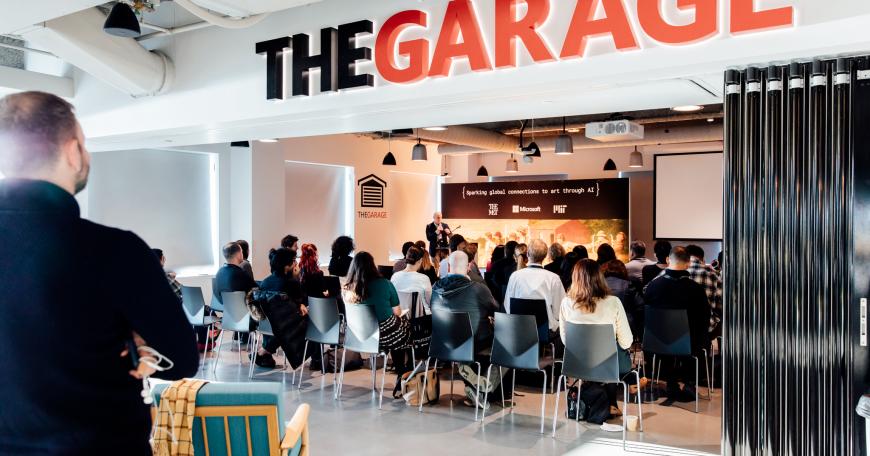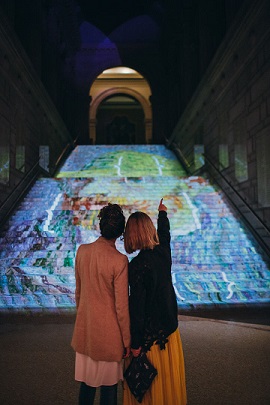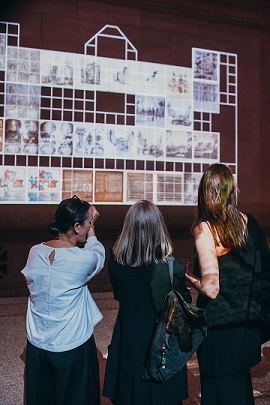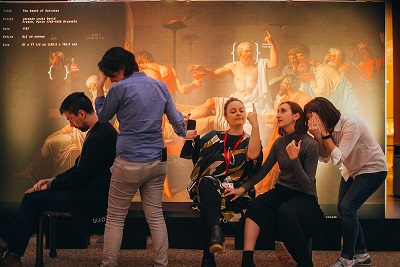
The Met, Microsoft, and MIT Explore the Impact of Artificial Intelligence on How Global Audiences Connect with Art
(New York, February 4, 2019)— The Metropolitan Museum of Art, Microsoft, and the Massachusetts Institute of Technology (MIT) revealed today the results of a recent collaboration—The Met x Microsoft x MIT—that imagines the new ways in which global audiences can engage with one of the world’s foremost art collections through artificial intelligence technologies. The collaboration is represented through a portfolio of prototypes, in various stages of development, each of which provides new perspectives on how artificial intelligence could transform future connections between people and art.
The Met x Microsoft x MIT collaboration marks the second anniversary of The Met’s Open Access Program, which has made the Museum’s collection one of the most accessible, discoverable, and useful on the internet by making all Creative Commons Zero (CC0) data and 406,000 high-res images from The Met collection available for use without restriction.
“The Met’s vast collection covers 5,000 years of art and culture from around the world, and it is our mission to create multiple means for people to engage with this remarkable resource, both onsite and online,” said Max Hollein, Director of The Metropolitan Museum of Art. “This exciting collaboration with Microsoft and MIT demonstrates the potential of open data and artificial intelligence to digitally broaden access to hundreds of thousands of images and scholarly records, and demonstrates the continually expanding impact of the Open Access Program.”
The Met developed a new subject keywords dataset for its collection, under CC0, which provides a more advanced way to search the collection based on topics of interest. These subject keywords were made available to leading curators, designers, artificial intelligence researchers, open learning specialists, and creative technologists from The Met, Microsoft, and MIT at an invitation-only, two-day hack event in December 2018 in Cambridge (MA). The features and prototypes created during the hack event will be revealed at the Museum this evening. Participants worked with The Met Collection API, the subject keywords, and Microsoft’s AI technologies, including Azure Cognitive Services, Azure Search, Azure Kubernetes Service, Microsoft Machine Learning for Apache Spark, conversational AI, and custom models with Azure Machine Learning.


“What makes us uniquely human is our ability to express our experiences and culture through art. The Met has done an incredible job of preserving and broadening access to their rich collection of artifacts. We are excited by the role AI can play to provide everyone the opportunity to discover and experience this great trove of art in entirely new ways,” said Mitra Azizirad, Corporate Vice President, AI Marketing at Microsoft. “The close partnership between The Met, MIT, and Microsoft is a great example of how AI is empowering curators and technologists to make art and human history accessible and relevant to everyone on the planet.”
This collaboration between The Met, Microsoft, and MIT—led by MIT Open Learning and the Knowledge Futures Group, a joint initiative between the MIT Press and Media Lab—demonstrates the potential of the subject keywords dataset and Open Access Program as well as the previously unavailable ways in which artificial intelligence can use open data. It also allows for a better understanding of the opportunities that are accessible to anyone using the images and data as part of the Museum’s Open Access program.
“MIT shares The Met’s commitment to open access, paired with the power of Microsoft AI, in order to empower people globally to create new knowledge and ways of experiencing art and culture that are so vital to our humanity,” said Sanjay Sarma, Vice President for Open Learning, MIT.

The Metropolitan Museum of Art launched The Met Collection API (application programming interface) in October 2018. This built on the Open Access Program announced in 2017 and enables any third party to sustainably integrate The Met collection into their website, ensuring that up-to-date versions of images and data are available to users.
“These prototypes demonstrate the incredible possibilities for artificial intelligence and open data to empower people globally through art,” said Loic Tallon, Chief Digital Officer of The Metropolitan Museum of Art. “We hope they inspire, invite, and empower communities around the world to use The Met collection and AI technologies to create new ways for audiences globally to connect with art. It is this aspect of the Open Access Program that is most transformative for The Met: it opens the door for all types of makers, creators, artists, and technologists to participate in the collection and develop new narratives from the histories captured within the artworks.”
More information about The Met x Microsoft x MIT collaboration is available at www.metmuseum.org/ArtMeetsAI, www.microsoft.com/inculture/ArtMeetsAI, https://openlearning.mit.edu/
Documentation and resources on how to use The Met Collection API, as well as additional information about Open Access, are available at metmuseum.org/openaccess.
About The Met
The Met presents over 5,000 years of art from around the world in three New York City locations—The Met Fifth Avenue, The Met Breuer, and The Met Cloisters. Since it was founded in 1870, the Museum has made art come alive in its galleries and through exhibitions and events, revealing both new ideas and unexpected connections across time and cultures.
About Microsoft
Microsoft (Nasdaq “MSFT” @microsoft) enables digital transformation for the era of an intelligent cloud and an intelligent edge. Its mission is to empower every person and every organization on the planet to achieve more.
About MIT
The mission of MIT is to advance knowledge and educate students in science, technology, and other areas of scholarship that will best serve the nation and the world in the 21st century. The Institute is committed to generating, disseminating, and preserving knowledge, and to working with others to bring this knowledge to bear on the world’s great challenges. MIT is dedicated to providing its students with an education that combines rigorous academic study and the excitement of discovery with the support and intellectual stimulation of a diverse campus community. We seek to develop in each member of the MIT community the ability and passion to work wisely, creatively, and effectively for the betterment of humankind.

